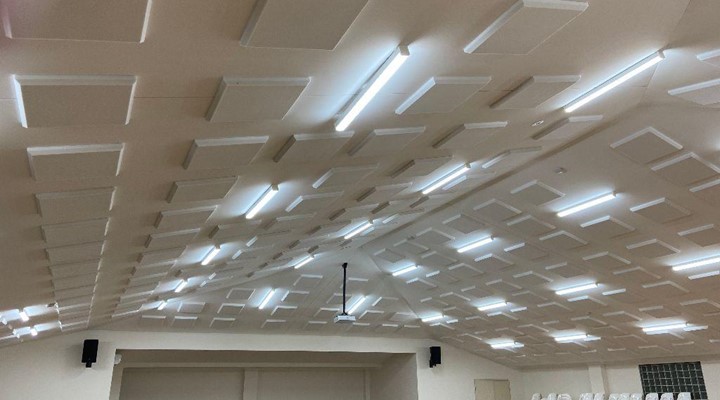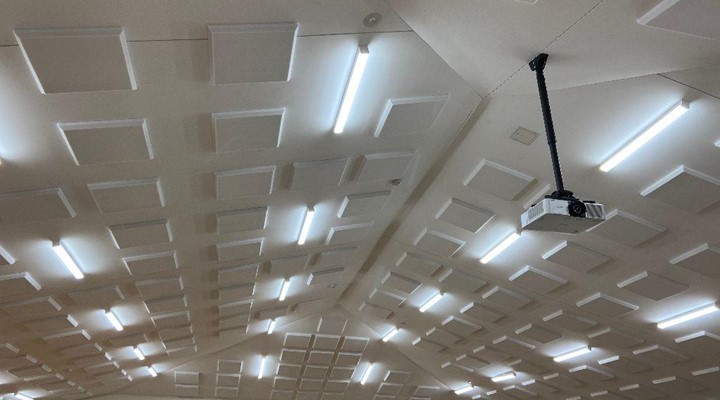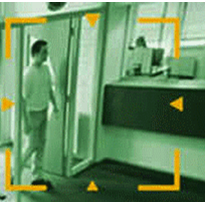Poor acoustics are the result of hard, sound relfective surfaces within a space.
A space encased in hard, sound reflective surfaces (and most are) and not tempered by any thing soft or sound absorbent causes high reverberation times.The reverberation time is the time taken for a single sound to decay by by 60 decibels from the time it is made. 5 seconds is an extremely high reverberation time. A reverberation time below .5 of a second is considered low.
These reflections are how echo's are created.
How it makes hearing difficult. All sounds made within the space will travel from the source directly to the ear. But, as well, reflections (echo's) of the same sound arrive at the ear, fractions of seconds apart, after bouncing many times from multiple reflective surfaces. So, in effect, the same sound will arrive at the ear dozens of times within a very short space of time, and, given that it may be a few seconds before the sound decays beyond hearing, this is long before the ear has had time to register and understand the first time it heard it. The pattern is repeated with each sound and as sound follows sound it builds to a confused cacophony, all fighting for the ears attention.
As our hearing deteriorates with age poor acoustics becomes more of an issue but it is much worse for the already hearing impaired, Autism and ADHD sufferers. In the case of those with Autism and ADHD it can cause severe agitation and stress.
Not only does poor acoustics compromise the clarity of desired sounds created within a space, it intensifies the level of interference caused by unwanted sounds that may enter the space from elsewhere. Additionally, poor acoustics will allow sound to travel further for longer and promotes the opportunity for it to escape from a space into surrounding areas. Apart from any annoyance that may cause within the affected areas it also compromises discretion where this may be required.
"Loud" spaces jar the nerves and raise stress levels. Poor internal acoustics, apart from having a profound effect on comfort and productivity, can effect also your health.
In industry, high noise levels and reverberation times have long been identified as an OH&S issue. These types of environments cause people to raise their voices and strain to hear which can result in headaches, sore throats, "ringing" in the ears and contributes to hearing loss. The raised stess levels can also affect your heart health. It is a little known fact that constant exposure to noise 20 decibels above what is comfortable can increase you risk of heart attack by 20%.
Whilst in industrial environments loud production machinery is a contibuting factor, noise levels can reach industrial proportions when poor acoustics promote a noise build up within a space, especially where they may be a lot of people.
Apart from general health and welfare, poor acoustics can also impair business, learning, pleasure and your relaxation.
A case could be argued that it may also be dangerous in emergency situations where instructions need to be clearly and rapidly understood.
Everybody knows a noisy restaurant that has great food but you won't go back to again because that pleasant dinner with friends was ruined by you having to shout at them across the table, you having to lean across the table to hear them (or trying to read their lips!) and everyone having to shout their order at the wait staff. And then, after a couple of hours, you leave to find your ears ringing, with perhaps a sore chest from shouting and a sore neck from straining to hear. That situation is often aggravated by those venues who consider the "background" music should be loud enough to be the main event! But that's another argument!
Now imagine how it feels to be the the wait staff who spend, literally, hours in that environment. And how because of this it is a very real health and safety issue for them and how, if the same noise levels were apparent in a manufacturing environment they would have to wear hearing protection or be rotated out of the space every few hours. Perhaps this seems an excessive description but it happens everyday in many restaurants and bars around the world and is a prime and relatable example of how poor acoustics can, apart from ruining your experience, affect your own health and welfare as well as the health and welfare of the employees and why it might affect the business.
For perhaps less critical, but, arguably no less important reasons, where poor acoustics causes poor sound clarity it can affect situations of student education, corporate training events, business meetings and video conferencing, fitness class and swimming instruction, community or church hall gatherings and open plan office productivity, amongst many others.
These kinds of issue are our specialty...so there is a solution!










